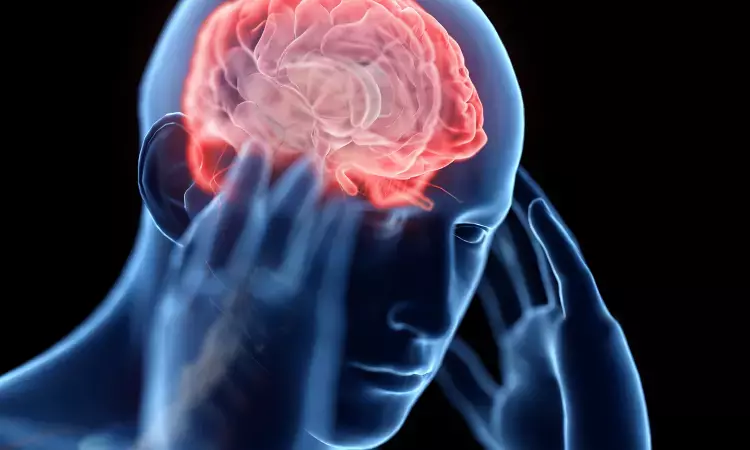- Home
- Medical news & Guidelines
- Anesthesiology
- Cardiology and CTVS
- Critical Care
- Dentistry
- Dermatology
- Diabetes and Endocrinology
- ENT
- Gastroenterology
- Medicine
- Nephrology
- Neurology
- Obstretics-Gynaecology
- Oncology
- Ophthalmology
- Orthopaedics
- Pediatrics-Neonatology
- Psychiatry
- Pulmonology
- Radiology
- Surgery
- Urology
- Laboratory Medicine
- Diet
- Nursing
- Paramedical
- Physiotherapy
- Health news
- Fact Check
- Bone Health Fact Check
- Brain Health Fact Check
- Cancer Related Fact Check
- Child Care Fact Check
- Dental and oral health fact check
- Diabetes and metabolic health fact check
- Diet and Nutrition Fact Check
- Eye and ENT Care Fact Check
- Fitness fact check
- Gut health fact check
- Heart health fact check
- Kidney health fact check
- Medical education fact check
- Men's health fact check
- Respiratory fact check
- Skin and hair care fact check
- Vaccine and Immunization fact check
- Women's health fact check
- AYUSH
- State News
- Andaman and Nicobar Islands
- Andhra Pradesh
- Arunachal Pradesh
- Assam
- Bihar
- Chandigarh
- Chattisgarh
- Dadra and Nagar Haveli
- Daman and Diu
- Delhi
- Goa
- Gujarat
- Haryana
- Himachal Pradesh
- Jammu & Kashmir
- Jharkhand
- Karnataka
- Kerala
- Ladakh
- Lakshadweep
- Madhya Pradesh
- Maharashtra
- Manipur
- Meghalaya
- Mizoram
- Nagaland
- Odisha
- Puducherry
- Punjab
- Rajasthan
- Sikkim
- Tamil Nadu
- Telangana
- Tripura
- Uttar Pradesh
- Uttrakhand
- West Bengal
- Medical Education
- Industry
Study Finds Increased Risk of Dementia After Hospitalization for Major TBI

MINNEAPOLIS: People who have been hospitalized for a major traumatic brain injury (TBI) may have a higher risk of developing dementia when compared to people who do not have a TBI, according to a new study published in the May 11, 2022, online issue of Neurology®, the medical journal of the American Academy of Neurology. Major TBI was defined as having bleeding in the brain and a hospital stay of three or more days. Researchers did not find an increased risk for people who had minor TBI, which was defined as a concussion with no more than a one-day hospital stay.
"Traumatic brain injury has been identified as a possible risk factor for dementia, and due to increasing numbers of people living with dementia, it is imperative to identify risk factors that might be modifiable to decrease the number of people who develop dementia in the future," said study author Rahul Raj, MD, PhD, of the University of Helsinki in Finland.
"The goal of our study was to assess the association between TBI and dementia while adjusting for other relevant dementia risk factors like high blood pressure, smoking, alcohol consumption and physical activity."
For the study, researchers used a Finnish national database that includes health surveys collected every five years. Focusing on a 20-year period, they identified 31,909 people who completed one or more surveys that included details on lifestyle factors such as physical activity, smoking and alcohol use.
Researchers then looked at national health registries. Of the study group, they identified 288 people hospitalized due to a major TBI and 406 hospitalized due to a minor TBI who did not have dementia within one year of their injury. A total of 976 people developed dementia over an average 16-year follow-up period.
Of those with a major TBI, 27 people, or 9%, developed dementia. Of those with a minor TBI, nine people, or 2%, developed dementia. And of those with no TBI, 940 people, or 3% developed dementia.
After adjusting for age and sex, researchers found that people who were hospitalized due to a major TBI had a 1.5 times greater risk of dementia than those without a TBI.
But after further adjustment for other relevant dementia risk factors such as education, smoking, alcohol consumption, physical activity and high blood pressure, the association weakened. Raj explained that alcohol use and physical activity appeared to play the biggest role in weakening the association.
Researchers found no increased risk of dementia for people hospitalized for minor TBI.
"Approximately one in 10 people in our study who had major TBI did develop dementia," said Raj. "Considering that there is no cure for dementia or TBI, the results of our study suggest that prevention of other dementia risk factors such as excess alcohol consumption and physical inactivity could possibly reduce the risk of dementia in people with major TBI. More research is needed in larger groups of people."
A limitation of the study was that it included only people hospitalized for TBI, so people who did not seek care for a mild TBI were not included.
Learn more about TBI at BrainandLife.org, home of the American Academy of Neurology's free patient and caregiver magazine focused on the intersection of neurologic disease and brain health. Follow Brain & Life® on Facebook, Twitter and Instagram.
When posting to social media channels about this research, we encourage you to use the hashtags #Neurology and #AANscience.
The American Academy of Neurology is the world's largest association of neurologists and neuroscience professionals, with over 38,000 members. The AAN is dedicated to promoting the highest quality patient-centered neurologic care. A neurologist is a doctor with specialized training in diagnosing, treating and managing disorders of the brain and nervous system such as Alzheimer's disease, stroke, migraine, multiple sclerosis, concussion, Parkinson's disease and epilepsy.
Dr Kamal Kant Kohli-MBBS, DTCD- a chest specialist with more than 30 years of practice and a flair for writing clinical articles, Dr Kamal Kant Kohli joined Medical Dialogues as a Chief Editor of Medical News. Besides writing articles, as an editor, he proofreads and verifies all the medical content published on Medical Dialogues including those coming from journals, studies,medical conferences,guidelines etc. Email: drkohli@medicaldialogues.in. Contact no. 011-43720751


